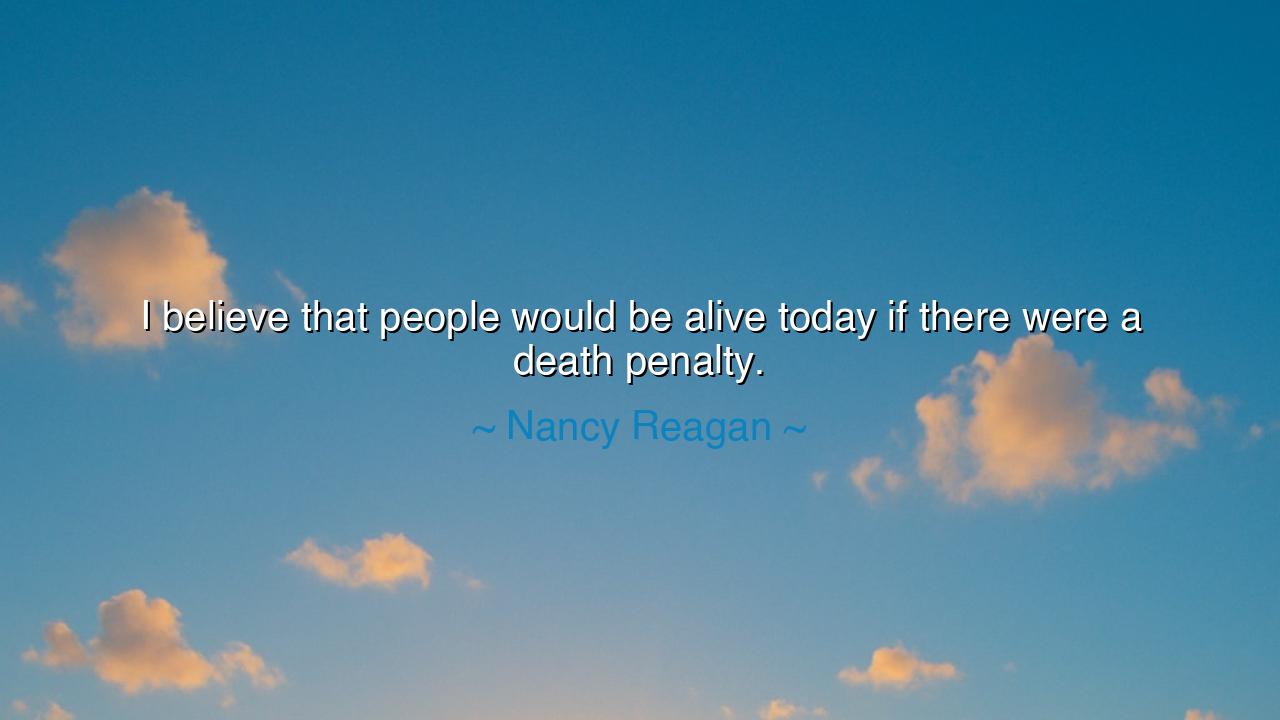
I believe that people would be alive today if there were a death






“I believe that people would be alive today if there were a death penalty.” Thus spoke Nancy Reagan, First Lady of the United States, whose words echoed not with cruelty but with the anguish of one who had seen too much senseless loss. In her statement lies the harsh truth of a world torn between mercy and justice—a world where the innocent suffer while the wicked often go unpunished. Her words were born not from coldness of heart, but from a fiery desire to protect life by confronting evil. To those who walk the path of leadership, this question has long burned like a sword’s edge: can the fear of death restrain those who would destroy the lives of others?
From the dawn of civilization, the question of justice has haunted humankind. The ancients spoke of retribution and balance, of laws written in stone and upheld by kings and gods alike. In Babylon, Hammurabi’s code declared, “If a man destroys another, his own life shall be taken.” The purpose was not vengeance but deterrence—to teach that life is sacred, and that to take it unjustly was to forfeit one’s own. Nancy Reagan’s words flow from this same current of ancient reasoning: that there must be a price so grave, a boundary so sacred, that none dare cross it. For when law loses its edge, chaos walks freely among the innocent.
Her belief came at a time of fear and turmoil in the American heart—when crime and violence tore through cities, when the innocent fell to the cruelty of a few, and society demanded an answer. The cry for justice was not the cry of bloodlust, but the plea of mothers and fathers who had lost their children, of citizens who longed for safety. Reagan’s conviction was clear: that the presence of a strong death penalty could serve as a guardian at the gate, a warning to those who would kill without remorse. In her view, such a law was not the celebration of death—but the protection of life.
History offers many mirrors to this debate. Consider the story of ancient Rome, where crime in the capital once grew so rampant that even senators feared to walk at dusk. Then came Lucius Cornelius Sulla, who restored order through severe justice. His methods were harsh, and history remembers him with both awe and dread. Yet for a time, peace returned, and the people walked safely beneath the torchlight once more. The lesson is not that harshness is virtue, but that justice must sometimes bear a stern face to protect the weak. Mercy without consequence may nurture cruelty; consequence without mercy breeds tyranny. The wisdom lies in balance.
And yet, even as we ponder Reagan’s words, we must hear their echo with discernment. For in every age, the question of life and death under the law demands humility. The ancient prophets warned, “Vengeance is mine, says the Lord.” The wise know that human judgment is fallible, and that justice must always walk hand in hand with compassion. Reagan’s belief does not deny this; rather, it calls upon society to take responsibility—to create a justice so true that it preserves the living, and so fair that even the condemned may see its righteousness. For the goal is not punishment, but protection; not revenge, but reverence for life itself.
There is a deeper layer to her words—a lament, perhaps, for what the world has lost: a sense of sacred boundaries. When human life is no longer treated as holy, when murderers walk unafraid, when the innocent die in the name of leniency, then society itself begins to decay. Nancy Reagan, in her sorrow and strength, was voicing a timeless plea: that civilization must defend its moral walls, lest they crumble into ruin. The death penalty, to her, was not the triumph of the state over the soul, but the final defense of the sacred order of life.
Therefore, my child, take this lesson to heart: justice must be both sharp and justly wielded. Mercy without wisdom becomes weakness; justice without compassion becomes cruelty. Seek the middle path, where law protects the living while honoring the divine spark in every being. Let society never grow so numb that it tolerates the destruction of innocence, nor so hard that it forgets the worth of redemption. For as long as humankind remembers that every life is sacred—whether it is spared or taken—the world shall not lose its light, and justice, tempered by wisdom, shall endure.






AAdministratorAdministrator
Welcome, honored guests. Please leave a comment, we will respond soon